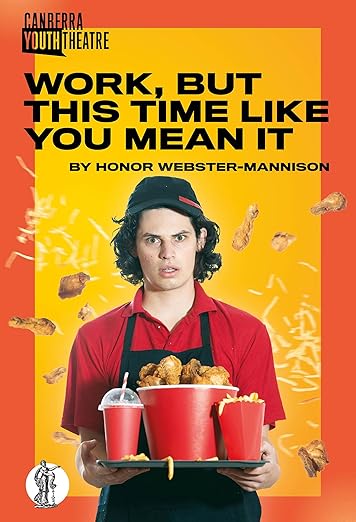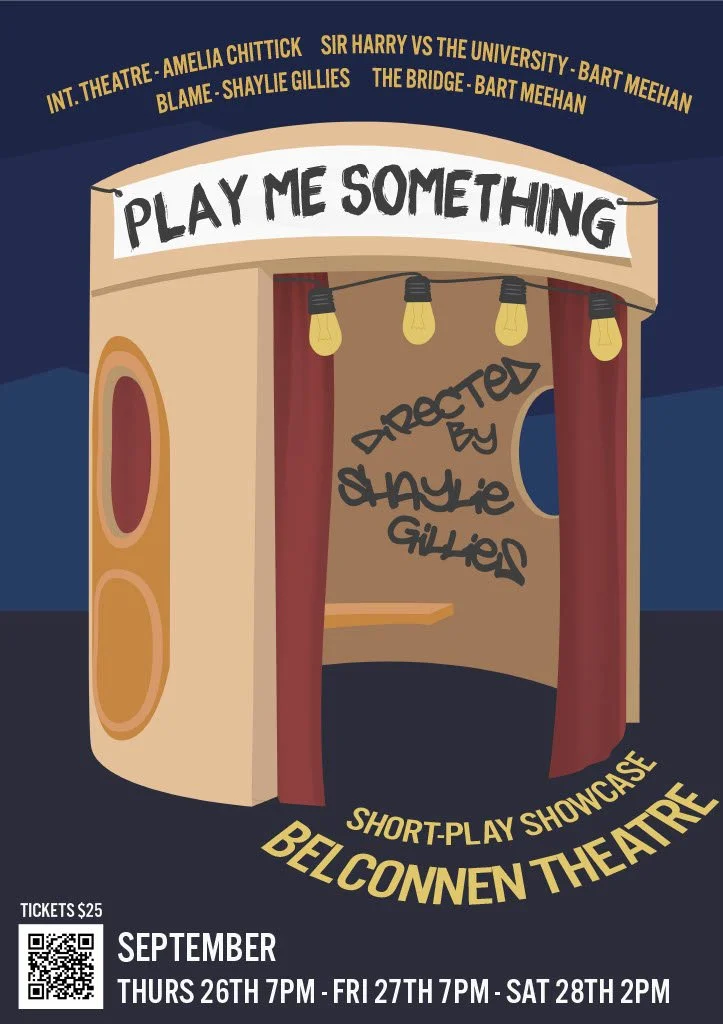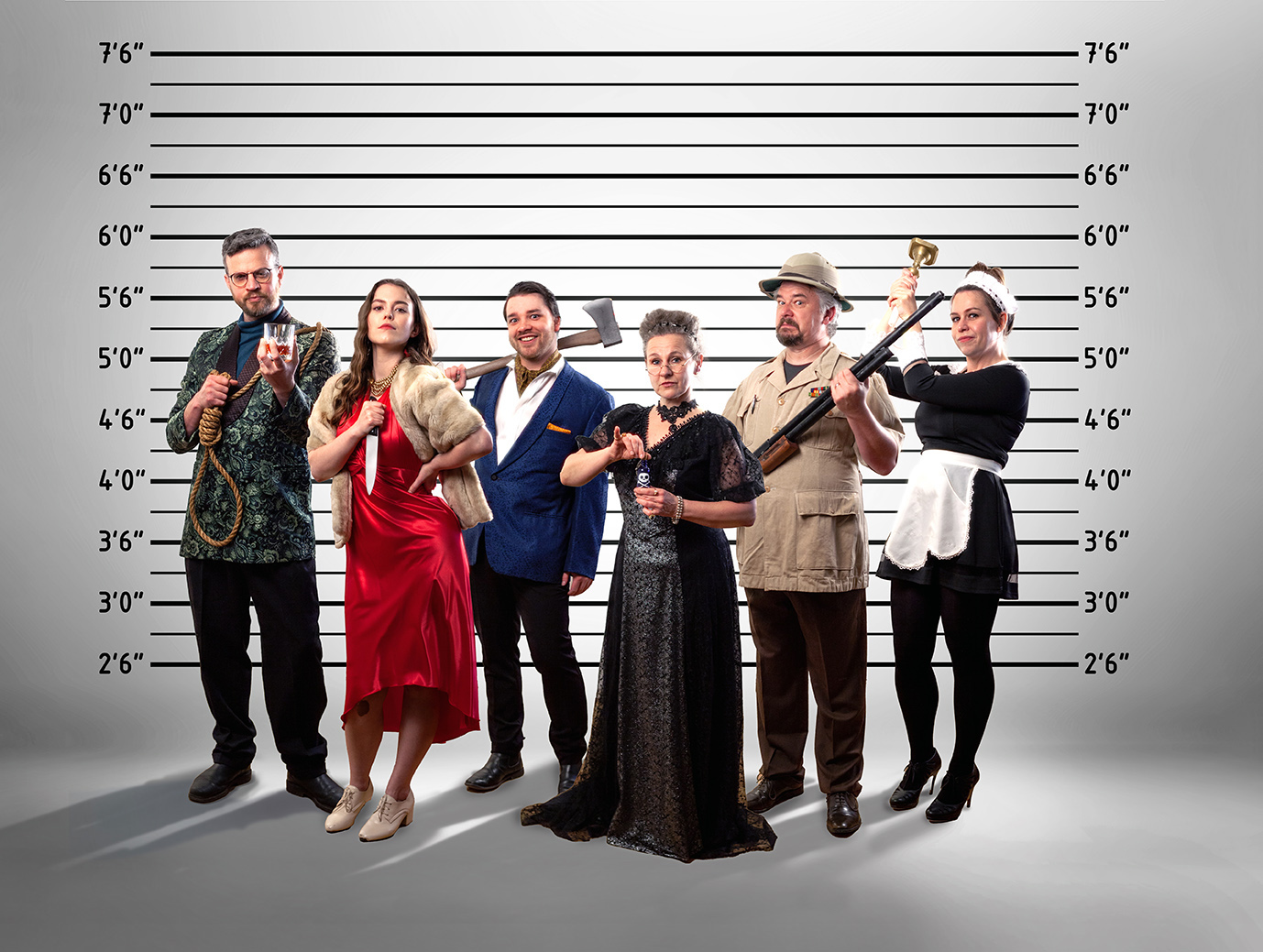- Away - Canberra Repertory Society, Theatre 3: This is considered an Australian classic, and it is treated as such, with weighty moments and dragging pauses. It tells the story of three internally conflicted families holidaying on the coast for Christmas, 1968 and, according to Wikipedia, is one of the most widely produced Australian plays of all time, being on the school curriculum in many states. It incorporates several moments of Shakespeare which don't so much subtley enhance the story but profoundly crash into it to try and suggest merit. This production doesn't hang well together, with some self-indulgent drama school moments (the storm at the end of the first act is enacted by cast practicing physical theatre in the way that non-theatre people is typical am-dram), but the sound (Neville Pye) and lighting (Nathan Sciberras) are excellent with a multitude of notes, techniques and colour to enhance the production. A variety of acting styles speak of a lack of cohesion - Callum Doherty excudes a flamboyant melodrama as Tom, a teenager with leukemia trying to experience all he can while he is well enough, while Andrea Close as Coral portrays the ups and downs of someone medictating through grief with great sincerity. The stage is not used to its full extent and scene changes are uneven - some of the cast remain in character to perform them; others don't. The play-within-a-play is appropriately intimate, and the half-painted scene for the 'beach' in the second act is evocative, although some of the kodak screen images are poorly projected and detract from the overall ambience. A stronger vision from director Lainie Hart communicated more clearly to all cast and crew might have helped this play find an even keel.
- Work But This Time Like You Mean It - Canberra Youth Theatre, Courtyard Theatre: A play about young people's first experiences in the workplace explores subjects such as trying to survive and have a good time on a minimum wage, dealing with demanding customers and irritating colleagues, and the realisation that this might be all there is for the endlessly foreseeable future. Written by Honor Webster-Mannison, the script won the 2022 Emerging Playwright Commission, and this production is really not as bleak as that might sound. Working in a fast food outlet (no names but it is red and yellow and the actors dress in chicken suits at one point), the characters are simply called after their positions, such as Shift Manager, Drive, Deep Fryer, Kiosk, etc. and perform repetive gestures, throwing and catching balls in synchronised movements. The young actors are mainly self-satisfied and have little rapport with their fellow cast members, with the possible exception of Kathleen Dunkerley as Register 1 (good range of pace and emotion) and Sterling Notley as Food Prep (measured and generous performance providing a foil to other actors). The set (Kathleen Kershaw) is the highlight of the piece, marking the transition between childhood (a soft play centre) and the slippery slope of post adolescence with a bright and obvious visual metaphor of a ballpit. Multiple overlapping voices, recorded speech, video games projections and dance breaks all add to the anarchic feeling, as directed by Luke Rogers, but each one of these elements could have been explored more thoroughly, instead of too many ideas appearing under-realised. The play has interesting moments and deliberately descends into chaos, but the unstructured disorder soon becomes tedious and looses the audience engagement.
- Play Me Something - Green Oak Theatre, Belconnen Community Centre: Four short plays with no apparent direction (although Shaylie Gillies is credited) or cohesion. INT.THEATRE by Amelia Chittick is a play about actors preparing to do a play, while Sir Harry vs, The University by Bart Meehan is a well-written comedy about a disgraced actor who applies for a job at a university only to sue for discrimination when they don't get the role. I was surprised to see that Blame by Shaylie Gillies is about the effect on the community of the Aberfan disaster, until I was told that the event featured heavily in the TV hit show, The Crown, which would explain why people in Australia suddenly know about it. The last play on the bill is The Bridge, also by Bart Meehan, which deals with family loss, grief, difficult relationships and distorted memories. Due to the changing sets required, these were necessarily perfunctory, although the use of sheets in Blame is interesting, and the Greek chorus effect adds a much-needed diversion. I also admire the decision not to make the cast attempt Welsh accents. Actors performing in different pieces are at best competent and have clear favourites, interpreting these and mumbling inaudibly through others. For example Chazelle Cromhot plays Professor Turner with solid gestures in Sir Harry, obviously relishing the role, while leaving unnecessary pauses and being almost completely uncommitted to the role of Daughter in The Bridge. While I applaud the motivation to bring short plays to the stage in search of a wider audience, the performance feels under-rehearsed and could be considered a drama exercise, but not a finished product. The poster is a highlight.
- The Inheritance Pts 1 & 2 - Everyman Theatre, ACT Hub: Seen over two nights (or for a solid six hours on a day with a matinee), this is a massive work of friendship and death, intended to be a re-imagining of E. M. Forster's Howard's End. It deals with homosexuality in the 1980s, so of course the promising young men are struck down by AIDS, in that decade's anthem for doomed youth. This is an intergenerational piece as the contemporary couple, Eric Glass (James McMahon) and Toby Darling (Joel Horwood) deal with the inherited trauma of that era through their privileged existence in Eric's family-owned apartment in New York. They are surrounded and embraced by a coterie of quasi-intellectuals, who shuffle bare foot across the boards, offering metaphorical foils if not rapier-like wit, and draping over each other to produce carefully posed tableaux. Self-referentially enough, Toby's semi-autobiographical novel is due to be adapted for Broadway, and he involves himself in the writing and the auditioning of himself through the character of Adam McDowell (Andrew Macmillan). It's full of in-jokes and meta-theatrical references, and it's actually quite hard to like these characters as they lounge about the stage reading and pontificating as though their every utterance holds weight. It doesn't. It's didactic and preachy and finishes with a monologue from Margaret (Karen Vickery), the only woman of the thumpingly male show, who loves all the rogues and scamps. And yet. Director, Jarrad West has done wonders with the material, not least in finding twelve men of solid acting ability. Joel Horwood's petulance is compelling, James McMahon's brooding presence is powerful, and Duncan Driver delivers an excellent commentary as the unfairly criticised E.M. Forster (why didn't he make his sexuality public?). There are simulations of sex and abuse, but the moment where an actor leapt into the arms of his acolytes who failed to catch him, leaving him crashing into the stage, was the one that really brought tears to my eyes.
- Bloody Murder - Canberra Repertory Society, Theatre 3: Canberra Repertory traditionally stages their final production of the year as a fun night out in which audience and actors main purpose is to have fun. This is achieved in Bloody Murder, written by Ed Sala and directed by Josh Wiseman. The premise is that the characters in a quintissential country house murder mystery get fed up with playing the same old roles and turn upon the author (and the audience) to forge new ground and subvert their sterotypes. Antonia Kitzel is the matriarch of the house, Lady Somerset; Glenn Brighenti is her nephew, Charles, waiting in the wings to inherit her fortune, Steph Roberts is the maid in the ridiculous sexy French maid outfit favoured of male directors while delivering a Sybil Fawlty-esque performance, Arran McKenna is the war bore, an uptight mayor from India via central casting, Stuart Roberts is Devon Tremaine, the alcoholic has-been actor, and Holly Ross is Emma and the Countess, with a variety of accents with which she has a lot of fun, although I would caution that self-satisfaction on stage doesn't always equate to enjoyment from the audience. This is an ensemble piece so there are not meant to be stand-outs, but Aaron McKenna and Stuart Roberts both excel in their commitment to harmonious performances, never pulling focus, remaining pitch perfect in vocal and physical delivery, and offering supportive presence demonstrating superior textual understanding. The technical details all serve the play well, particularly the sound where Neville Pye is in his element, heightening atmosphere in an ironic manner from creaking floors to sensuous foreboding mood music. When it remembers not to take itself too seriously, this play is a lot of fun.
Friday, 29 November 2024
Friday Five: Bits of Theatre Reviews
Subscribe to:
Comments (Atom)


.jpg?format=2500w)
